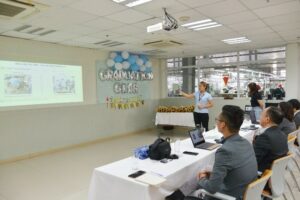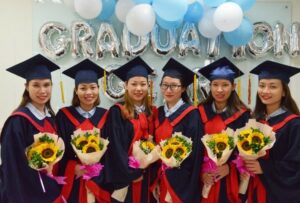Ngoc Khong, a young female sewing worker, has been working at Esquel Garment Manufacturing Vietnam Hoa Binh Co., Ltd. (or ‘Esquel Hoa Binh’) for more than 7 years. In the first few years, she joined the factory as a sewing worker. Since then, Ngoc has demonstrated impressive performance and great commitment, which led to her consideration for the line supervisor role. To achieve further development, Ngoc was selected to join the Gender Equality and Returns (GEAR) training course to sharpen her technical skills to meet the requirements of being a line supervisor. After a 4-day GEAR training program in Hanoi on soft skills and technical knowledge, Ngoc acquired many of the necessary skills and knowledge for a line leader’s work. After the training, Ngoc spent a few weeks working on the production line as a trainee supervisor to eventually take on supervisory role. Ngoc’s training was a success.
Ngoc’s story is just one of the many of women that have worked within the GEAR programme. Better Work’s global gender strategy aims to help create a society in which women and men are free from gender-based discrimination, and provides them access to decent work. To achieve this goal, the Better Work Vietnam programme, with support of the IFC and the Government of Japan, has launched the extended phase of the GEAR initiative in 2020. The GEAR initiative sets out to help female workers like Ngoc strengthen their competencies to advance their careers.
In early 2021, Ngoc was rotated into the role of cutting line supervisor at Esquel Hoa Binh.
“Job rotation is our practice of encouraging employees, especially those being considered for supervisory and management roles in our factory,” says Mr. Long Vu, Deputy Production Manager, Esquel Hoa Binh.
“This rotation will lay a solid foundation for these staff, as it enables them to deeply understand various roles and responsibilities in different production sections of the factory. After that, they will learn to improve their technical knowledge and skills, and practice their interaction and problem-solving skills.” Mr. Long Vu says that this practice of rotation not only encourages workers but also results in greater work efficiency and higher productivity overall.

“I struggled a bit when I was assigned to be the cutting team leader, as I did not have much experience in this section,” says Ngoc. “However, I tried to overcome these difficulties by talking and communicating more with the workers in the new line to better understand their daily tasks and actively listen to their concerns and challenges,” says Ngoc. She also managed to apply GEAR knowledge and skills into her new role, like line balancing, bottleneck solving and effective communication.Although the job rotation is a positive development for her career, Ngoc has faced some difficulties in the initial stage, which she has tried to overcome through a phase of trial, error and improvement.
“It is very challenging in the first few months, but I wanted to pursue this opportunity for stronger career development, rather than sticking to the same role for years,” she explained.
Ngoc has begun to apply some small improvements in the production process that she learned from GEAR, such as adding clothes of different colors to ease the cutting process, and modifying the machines to reduce cutting times from 5 seconds to 2 seconds. Although these improvements may seem minor, they will gradually contribute to improved productivity.
“Each line supervisor is considered as a mini factory manager. Each Esquel manager or supervisor must go through a learning and self-improvement process, while exposing them to all aspects of the factory during job rotation,” says Mr. Long Vu. “After that, they will be able to strengthen not only their technical and communications skills, but also inspire others.”
